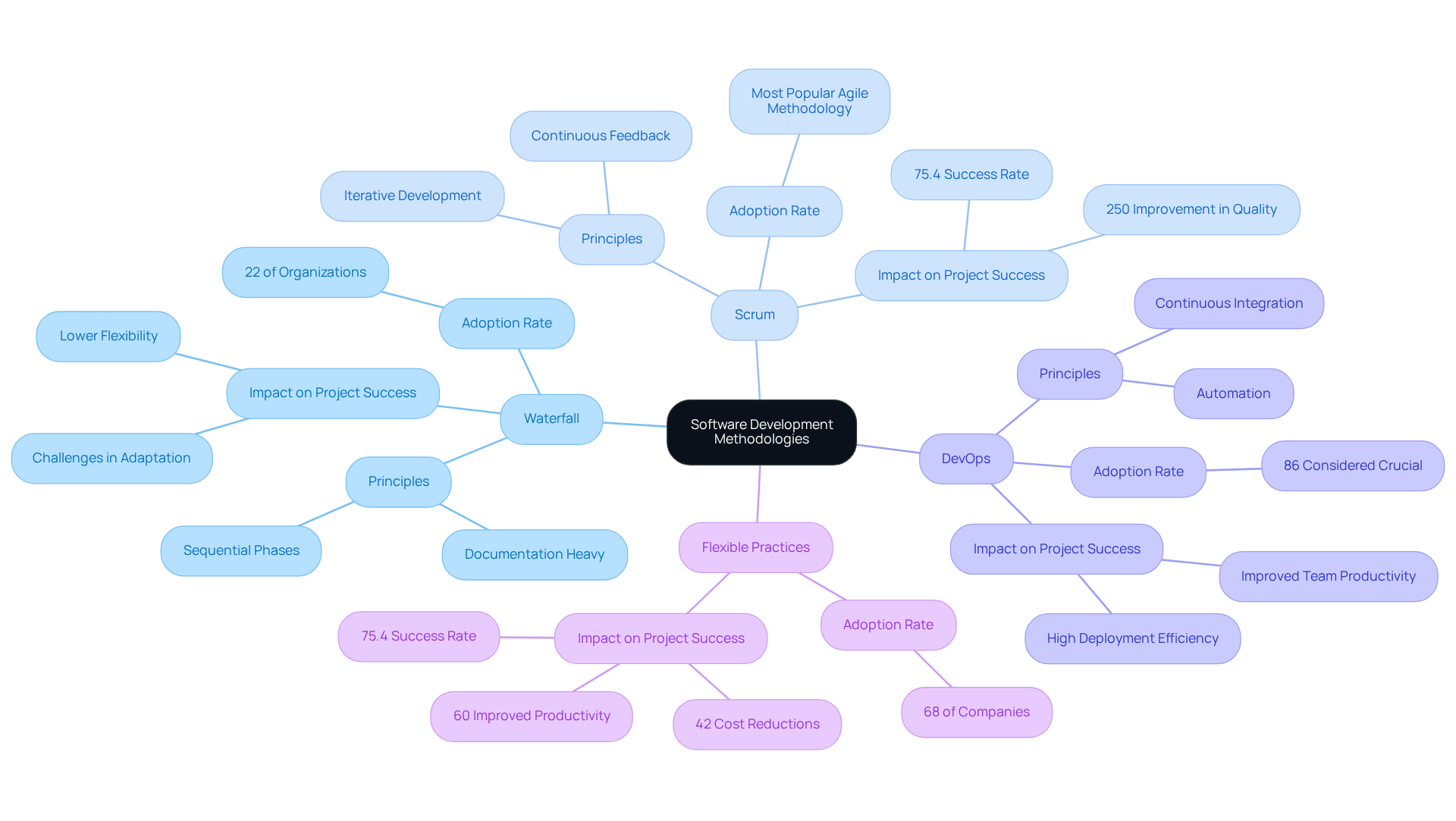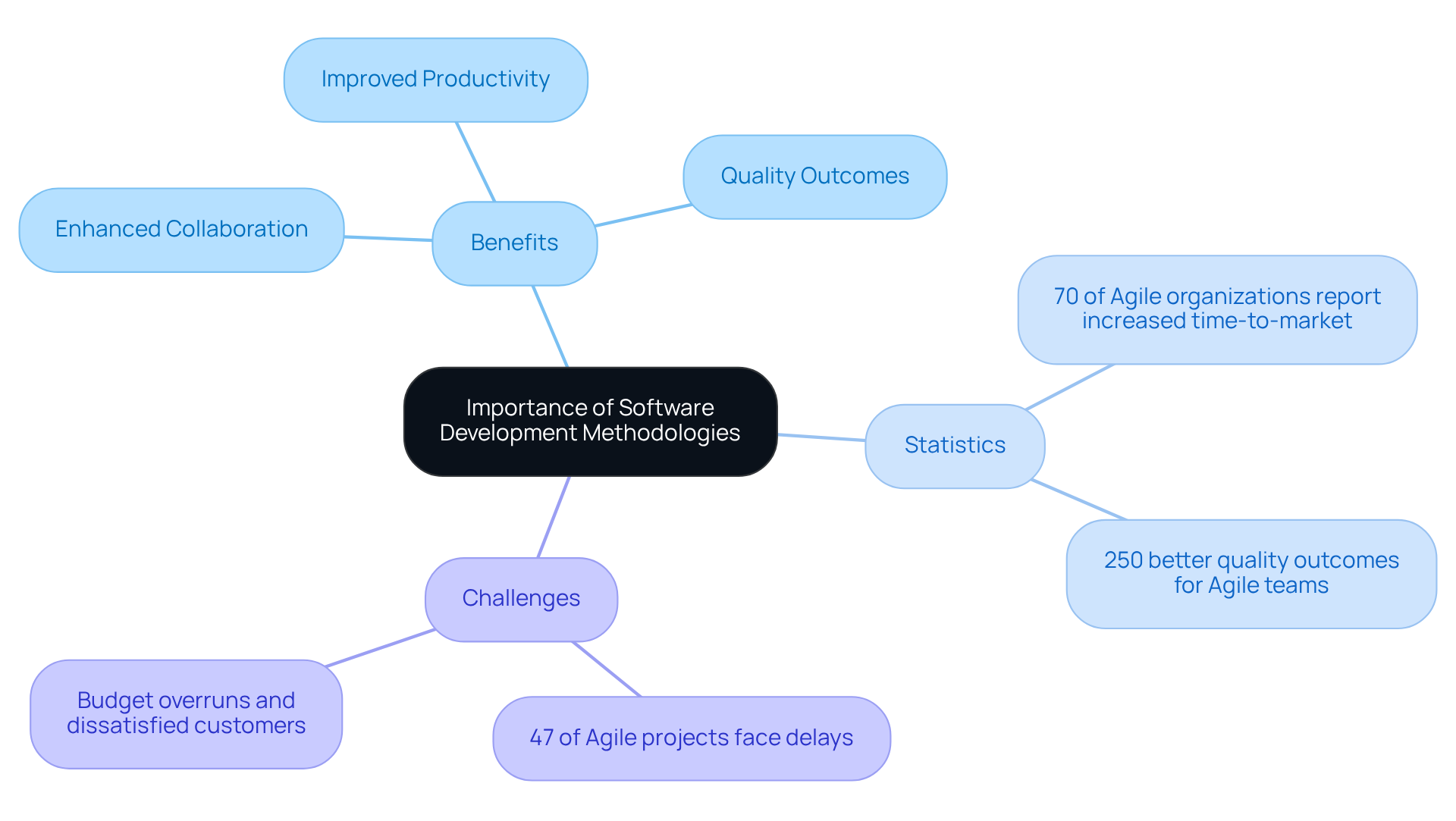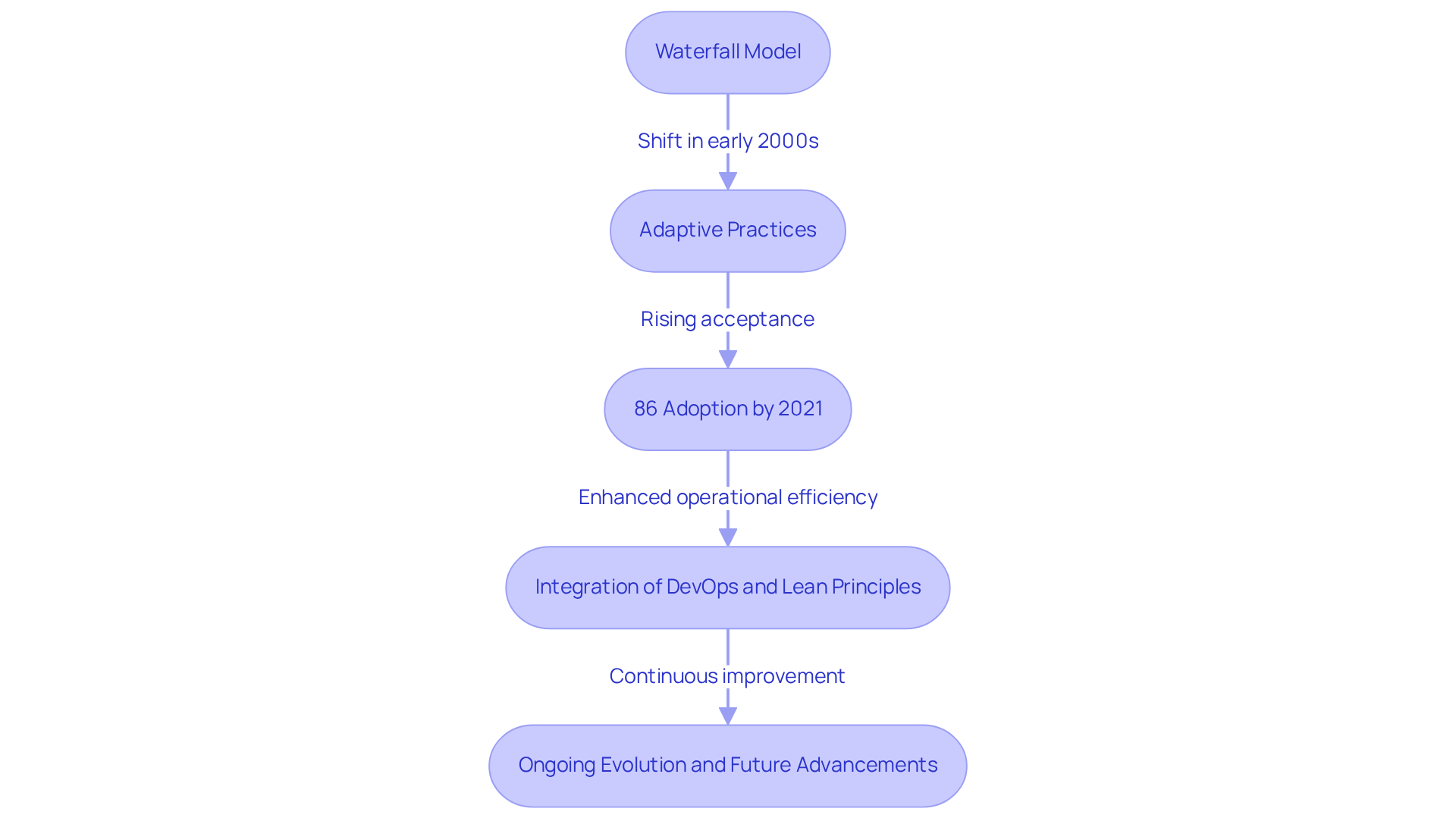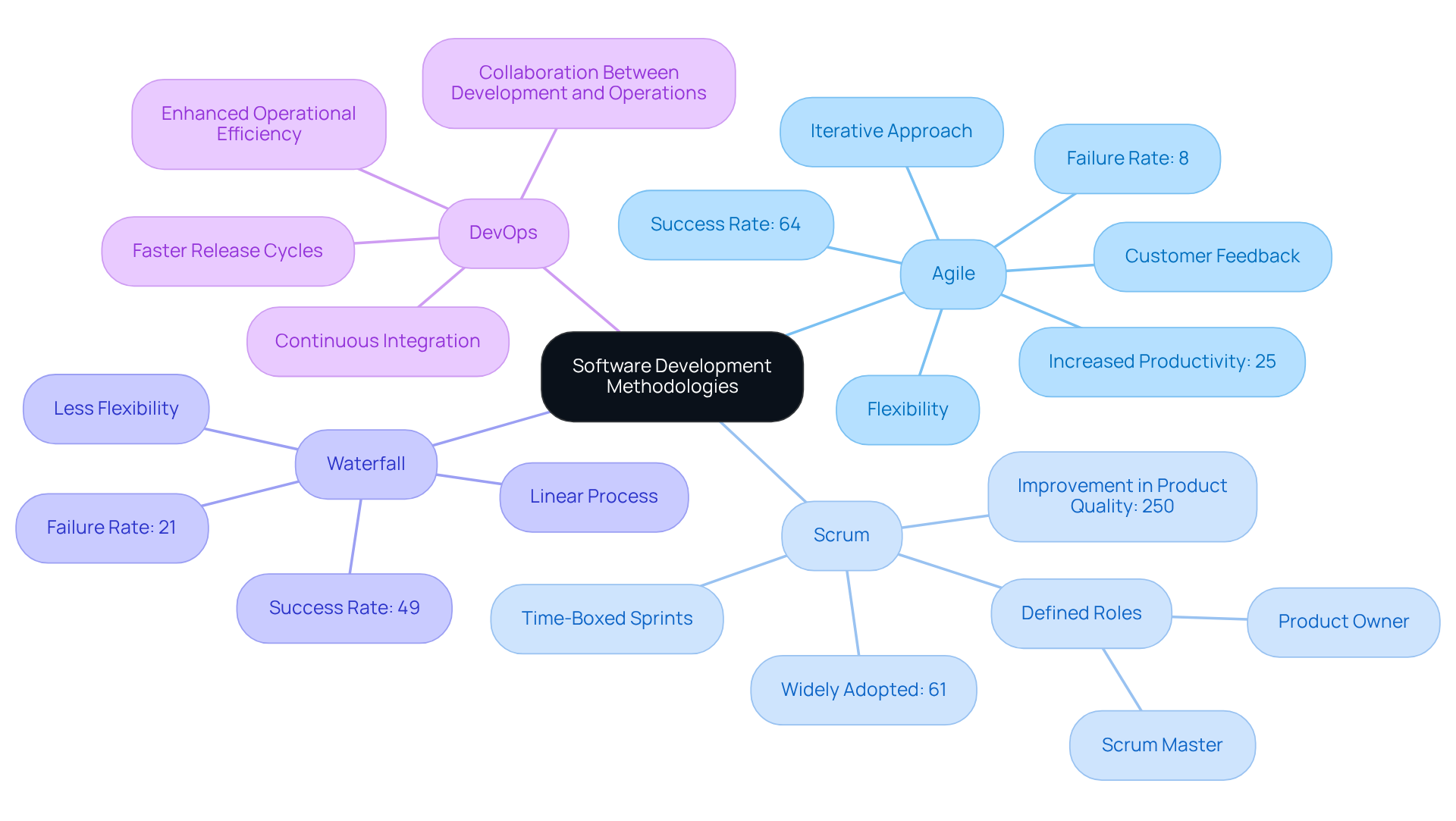AI
our blog
Understanding Software Development Methodologies and Their Impact

Overview
Software development methodologies play a crucial role in determining project success by offering structured frameworks that bolster collaboration, productivity, and adaptability. Organizations that adopt flexible methodologies, such as Agile and DevOps, consistently report higher success rates and improved outcomes compared to those relying on traditional approaches. This trend underscores the effectiveness of these methodologies in addressing the dynamic demands of modern projects. Furthermore, the ability to adapt swiftly to change is not merely advantageous; it is essential for maintaining competitive edge in today’s fast-paced environment. Embracing these methodologies can lead to significant enhancements in project delivery and overall organizational performance.
Introduction
The landscape of software development is evolving at an unprecedented pace, with methodologies playing a pivotal role in shaping project planning and execution. As organizations increasingly embrace flexible practices, the effectiveness of methodologies such as Agile, Scrum, and DevOps becomes apparent. These frameworks enhance collaboration, boost productivity, and align outcomes with business objectives.
However, despite these advantages, many teams continue to face challenges that threaten project success.
What factors contribute to the effectiveness of these methodologies?
How can organizations navigate the complexities of software development to achieve optimal results?
Define Software Development Methodologies
Software development methodologies serve as systematic frameworks that guide the planning, execution, and management of software projects. These software development methodologies include a variety of practices, techniques, and processes designed to help teams deliver high-quality software products efficiently. Among the most recognized software development methodologies are Waterfall, Scrum, and DevOps, each characterized by unique principles and practices.
As of 2025, approximately 68% of companies have adopted flexible practices, signifying a substantial shift from traditional Waterfall methods, which continue to be utilized by about 22% of organizations. This transition underscores the growing recognition of software development methodologies as effective tools for enhancing adaptability and responsiveness to evolving project requirements.
The impact of software development methodologies on project success is profound. Research indicates that organizations employing flexible practices report a project success rate of 75.4%, significantly higher than the success rates associated with traditional approaches. Additionally, 42% of enterprises focusing on flexible strategies experience some cost reductions in development, while 60% of organizations using adaptive practices report improved team productivity and revenue growth. Experts consistently highlight that flexible software development methodologies promote better collaboration, heightened group productivity, and stronger alignment with business objectives.
A critical component of successful project management is the integration of DevOps practices, particularly continuous integration and automation. Continuous integration enables developers to regularly merge their code changes into a central repository, followed by automated builds and tests, which enhances deployment efficiency. Moreover, one-click deployment and rollback features simplify digital product updates, allowing teams to swiftly adapt to changes and recover from issues without significant downtime. Real-time performance optimization is also essential, ensuring that applications maintain an appropriate balance between cost, speed, and resources.
The successful implementation of flexible practices in software projects often hinges on a commitment to software development methodologies that prioritize iterative development and continuous feedback. Teams that fully embrace these principles tend to achieve superior quality outcomes, with studies revealing that teams practicing full Scrum experience a 250% improvement in quality compared to those that do not estimate. This effectiveness is further supported by the fact that 95% of IT leaders regard flexible practices as vital for their operations, indicating widespread endorsement of these approaches in promoting project success. Furthermore, 93% of Agile organizations report enhanced customer satisfaction, highlighting the effectiveness of Agile in achieving business objectives.
However, it is crucial to acknowledge the challenges encountered in software creation, such as the 34% of project failures attributed to selecting the wrong programming language or toolset, which can hinder the success of any approach employed. By leveraging DevOps automation, including centralized log management, organizations can bolster security and incident management, ensuring that their cloud infrastructure is protected throughout the lifecycle and that any significant incidents are addressed promptly, minimizing potential disruptions.

Explain the Importance of Software Development Methodologies
Software development methodologies are essential for enhancing group collaboration and productivity. By providing a structured framework, software development methodologies establish clear roles, responsibilities, and timelines, which significantly improves communication among team members. This clarity not only reduces the likelihood of project failure but also fosters a cooperative environment where teams can effectively manage risks and adapt to changes.
For example, flexible practices promote iterative progress, allowing teams to respond swiftly to feedback and evolving demands. Notably, 70% of agile organizations report increased time-to-market, underscoring the effectiveness of this approach in expediting project delivery. Furthermore, a study revealed that 81% of leading organizations prioritize the enhancement of technical skills, highlighting the critical importance of continuous learning within flexible frameworks.
Case studies illustrate that teams employing flexible software development methodologies achieve 250% better quality outcomes compared to those that do not engage in estimation, highlighting the tangible benefits of organized practices in software development. However, it is crucial to acknowledge that 47% of Agile projects experience delays, budget overruns, or dissatisfied customers, indicating potential challenges inherent in this approach.
Overall, the integration of efficient methodologies not only aligns final products with user expectations and business objectives but also drives significant improvements in productivity and project success rates.

Trace the Evolution of Software Development Methodologies
The evolution of software development methodologies started with the Waterfall model, which was predominant in the early computing landscape. This linear approach, marked by distinct sequential phases, often encountered difficulties when faced with changes after a phase's completion, resulting in significant challenges as software projects grew in complexity. Recognizing these limitations, the early 2000s ushered in software development methodologies that introduced adaptive practices, flexibility, and collaboration into the development process. This adaptable framework enables teams to respond to changes more effectively, fostering a culture of continuous improvement and iterative advancement.
Recent statistics underscore the rising acceptance of flexible software development methodologies, with 86% of software development teams adopting these practices by 2021—a remarkable increase from 37% just a year prior. This transformation reflects a broader trend in which organizations emphasize speed, productivity, and adaptability in their software development methodologies. Furthermore, the integration of DevOps and Lean principles has further enhanced operational efficiency, empowering teams to deliver high-quality software at an accelerated pace.
At Studio Graphene, we harness the talents of our diverse team, including creatives, UX designers, product managers, engineers, and analysts, to provide comprehensive solutions swiftly and efficiently. Expert insights affirm the importance of this shift; numerous industry leaders advocate for software development methodologies as a strategic priority for organizations aiming to innovate and maintain a competitive edge. As these software development methodologies continue to evolve, it is evident that their principles are becoming indispensable in modern software development, paving the way for future advancements in the field.

Identify Key Characteristics of Popular Software Development Methodologies
Each popular software development methodology possesses distinct characteristics that cater to various project needs. This methodology stands out for its iterative approach, prioritizing collaboration and ongoing customer feedback, fostering adaptability and responsiveness.
Continuous integration plays a vital role in flexible development, enabling product developers at Studio Graphene to regularly merge their code changes into a central repository, followed by automated builds and tests. This practice enhances code quality, reduces integration issues, and accelerates release cycles, ensuring that updates are seamless and reliable.
Scrum, a widely adopted framework within iterative development, emphasizes structured time-boxed sprints and defined roles, such as Scrum Master and Product Owner, facilitating focused teamwork and accountability. In contrast, the Waterfall model follows a linear and sequential process, which can hinder flexibility and responsiveness to change.
DevOps merges development and operations, promoting continuous integration and delivery, thereby enhancing collaboration and operational efficiency. Understanding software development methodologies is crucial for teams to choose the approach that best aligns with their project requirements and organizational culture.
Notably, Agile methodologies have been shown to achieve a 64% success rate compared to 49% for Waterfall, highlighting the growing trend towards Agile adoption in 2025.

Conclusion
The exploration of software development methodologies underscores their essential role in enhancing the efficiency and success of software projects. By providing structured frameworks, methodologies such as Agile, Scrum, and DevOps empower teams to navigate complexities and respond adeptly to changing requirements. This transition from traditional Waterfall methods to more adaptable practices underscores the significance of flexibility in achieving project goals and boosting overall productivity.
Insights from the article reveal that organizations that embrace flexible methodologies witness markedly higher success rates, improved team collaboration, and reduced costs. The integration of practices such as continuous integration and automation further streamlines processes, enabling quicker adaptations and superior quality outcomes. Despite challenges like project delays and tool selection issues, the advantages of adopting modern methodologies are evident—teams prioritizing iterative development and continuous feedback consistently outperform their peers.
In light of these findings, it is imperative for organizations to acknowledge the transformative impact of software development methodologies on their projects. Embracing these frameworks not only aligns software products with user expectations but also cultivates a culture of continuous improvement and innovation. As the landscape of software development evolves, prioritizing the right methodologies will be crucial for teams striving to maintain a competitive edge and drive future success.









